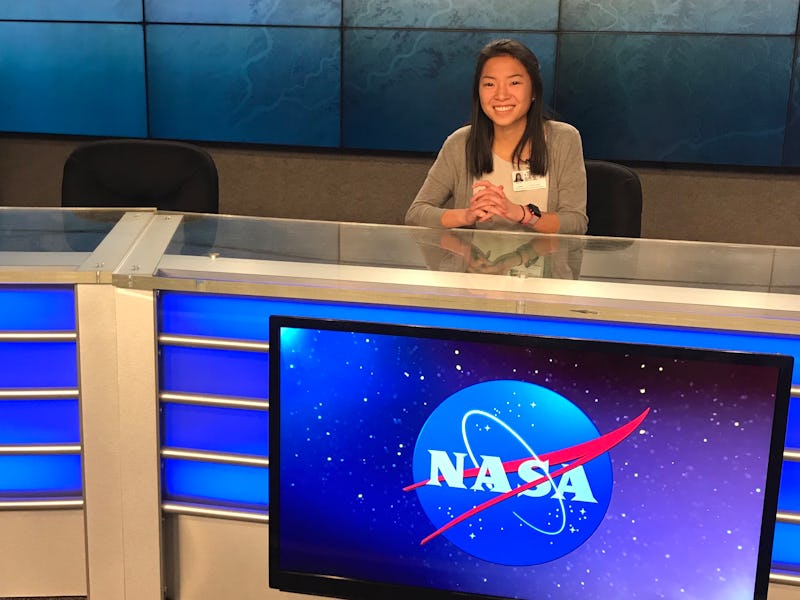Tennessee Teen Sent a Box of Human Teeth to the ISS on a SpaceX Rocket
"I have a job. I hang out with my friends. I'm pretty normal."

Somewhere, among the 5,600 pounds of supplies that went up to the International Space Station in SpaceX’s Dragon capsule on Wednesday, there was a box of teeth. This science experiment was the brainchild of Adia Bulawa, a Tennessee teen who won a NASA competition to propose experiments to conduct on the ISS.
The 18-year-old Bulawa, on the phone with Inverse from her hometown of Greeneville, explains that she wanted to test whether UV-activated dental glue will be any better at filling cavities in microgravity than regular old dental paste.
“They’ve actually done it in space before, because there was a dental emergency,” she says, referring to NASA astronaut Terry Virts’s attempt to patch a filling with dental paste. “It actually fell out the next day.” In her experiment, the UV glue, squirted onto broken human teeth, will be tested for its bonding strength.
The thinking behind the project, one of two winners of NASA’s Guardians of the Galaxy Space Station Challenge, reflects Bulawa’s dream of becoming a NASA engineer and her excitement about the future of space exploration.
"I’ve been doing this since I was in second grade.
Bulawa, who has been solving STEM puzzles her whole life, seems more than equipped for her future career. “I’ve been doing this since I was in second grade,” she says. “You know they had a contest to name the next Mars rover? I was actually one of the finalists in that.”
Had she won, the beloved Curiosity Rover would have been named Amelia — after the legendary pilot. Her parents continued encouraging her and her sisters to enter STEM contests and challenges, both because they were good learning opportunities and because they were fun to do.
“It’s fun for us, not only as a family, but we get our friends involved,” she says. “We would make hot dogs outside with a mirror. We just did crazy stuff.”
In her experiment, broken teeth are patched together with UV-activated glue, and the strength of the bond will be assessed.
In 2015, one of those crazy family experiments, which found a way to water plants in a hydroponic garden using centripetal force, became the first project that Adia, together with her sisters Maryann and Lilia, sent to the ISS. They called it the Garden of Extra Terrestrial Organic Nutrition — or ETON for short. More science competitions, like 2016’s Rocket21 Journey to Mars challenge, followed. Her most recent accomplishment only further prepares her for her upcoming freshman year as an engineering student at the University of Tennessee, Chattanooga — and, further down the line, a NASA employee.
“But to make it clear,” she points out, “I don’t wanna be an astronaut. I just wanna be on ground control.”
Science prowess aside, Bulawa is like most 18-year-olds, going to football games, playing sports like golf and tennis, and just plain old hanging out. “I have a job,” she says. “I hang out with my friends. I’m pretty normal.” Lighthearted and quick to laugh, she doesn’t seem to think her deep interest in science and space exploration is that extraordinary. It’s just what her generation is into, at least in part thanks to Elon Musk, whose SpaceX rocket took her most recent project to space.
Bulawa is attending the University of Tennessee Chattanooga for engineering next year.
“I think he’s gotten everyone, especially my generation, really pumped for the future,” she says.
Though she hasn’t had a chance to correspond with Musk about her work, she knows what she’d tell him if she had the chance: ‘I would tell him that he’s doing a good job, doing everything that he’s doing with the space community.”
Kids even younger than her might say the same about Bulawa, who humbly chalks up her science success to simply trying to learn as much as possible and being open to new, seemingly strange ideas — whether that’s the prospect of interstellar dentistry, space gardening, or mirror-powered hot dog roasting. You never know, she explains, when that knowledge will come in handy.
“Well, if I go camping,” she laughs, “I”ll just bring a mirror and call it a day.”